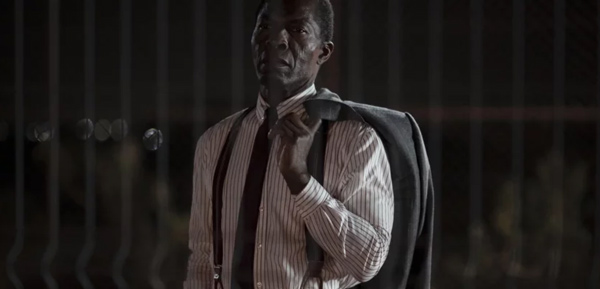Cri du cœur: Denis Delivers A Boiling Colonial Drama Dripping With Sexual Tension
A border is simply a line on a map. A fence is little more than a piece of metal or wood staked into the ground. As capitalism dictates, it’s not always the law that determines the right of passage across land and territory, but the price you’re willing to pay. Thus, what are clearly demarcated lines become grey zones of commerce and morality and it’s in that space that Claire Denis unravels her latest feature The Fence (aka Le Cri des Gardes). Boiling with homoeroticism and wounded with the scars of post-colonialism, the director’s sensibilities still manage to shine through an overly talky picture.
Horn (Matt Dillon) is a foreman on a construction site in an unspecified West African country. Due to a recent workplace injury, he’s received a large insurance payout, and it’s his last night on the job before he makes his way home. But his plans are complicated by the arrival of Alboury (Denis-regualr Isaach de Bankolé), who has traveled from a nearby village to collect the body of his brother who was killed, and possibly murdered, on the worksite. Standing calmly in a pressed suit on the dirt road outside the compound, Alboury’s arrival vexes Horn. Where the family of others who have died on the site have accepted cash bribes in turn for not asking too many questions, Alboury holds firm. He won’t leave until he’s in possession of his brother’s body.
The night gets worse for Horn when his girlfriend Leonie (Mia McKenna-Bruce) shows up, who Alboury dismisses as the “coin that fell on the ground that shines for no one.” Indeed, the beautiful young woman draws little attention from the distracted Horn. She earns more interest from Cal (Tom Blyth), Horn’s number two, but it could be as much from sexual interest as profound jealousy. Leonie has clearly stepped into something more than a professional relationship between Horn and Cal, while her own motivations might be attached to the dollar signs Horn will be bringing back home with him.

Based on the play Black Battles with Dogs by Bernard-Marie Koltès, the screenplay by Denis, Suzanne Lindon, and Andrew Litvack seems to have undergone little editing in its journey to the big screen. Aside from the almost Bartleby-esque Alboury, the actors are saddled with long monologues and ponderous passages that the performers don’t always have the easiest time handling. Coupled with the story’s singular setting, The Fence never feels free from its stage origins. However, it speaks to Denis’ filmmaking finesse that the picture’s themes still manage to strongly resonate.
The Fence acts as a microcosm of the West’s exploitative political and economic footprint in Africa, with the story zeroing in specifically on the little value put on Black bodies within the schematic of so-called capitalist progress. Horn puts an actual price on Alboury’s brother, offering $150 U.S. dollars first, before bumping it up to $300. When Aboury refuses the payment, Horn can’t comprehend why this relatively small fortune in a poor country would be rejected, and resents the guilt he’s made to feel. “It’s really unpleasant, feeling your presence,” Horn tells Alboury. Indeed, Alboury has a ghostly bearing, calmly haunting not just Horn’s physical space, but his mental space too.
As the evening wears on, Cal becomes more defiant and unhinged, as his own culpability in Alboury’s brother’s death and the nuances of his relationship to Horn come to the fore. Blyth’s is perhaps the best turn in the picture. Least successful is McKenna-Bruce as Leonie only because, as the audience surrogate, her role at times feels superfluous to what is plainly visible on screen.
Denis’ best pictures find bodies in motion, and elicit profound meaning in their rich visual language (now a third consecutive feature with cinematographer Éric Gautier). The Fence is unusually didactic for the filmmaker, with its adherence to the source material often blunting a much more absurdist, yet no less potent drama hiding beneath the surface. Yet, the film stands, straight and tall, much like Alboury, casting an undeniably sharp indictment of Western moral malfeasance.
Reviewed on September September 8th, at the 2025 Toronto International Film Festival (50th edition) – Special Presentations. 105 Mins.
★★★/☆☆☆☆☆


